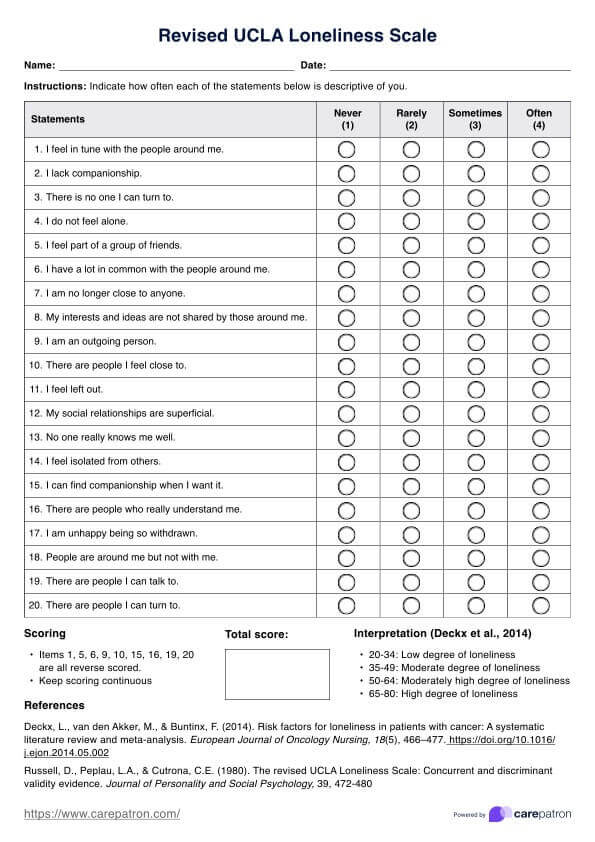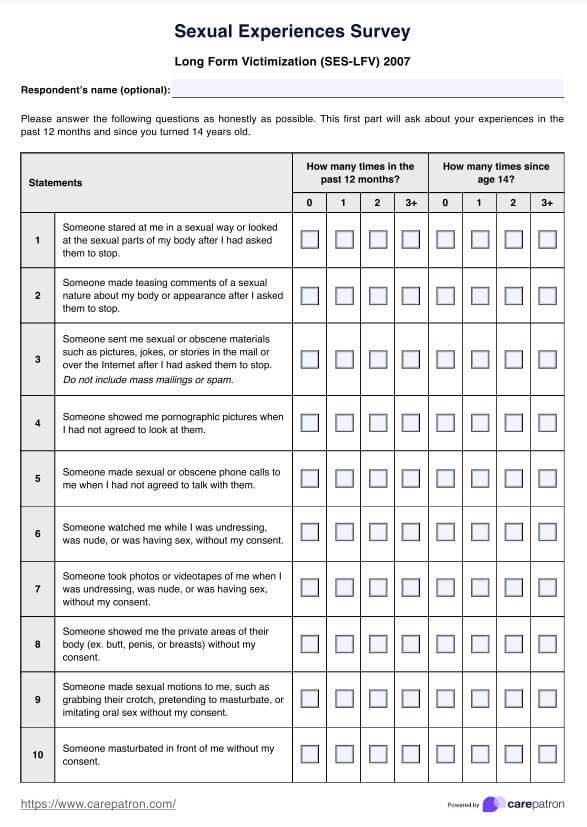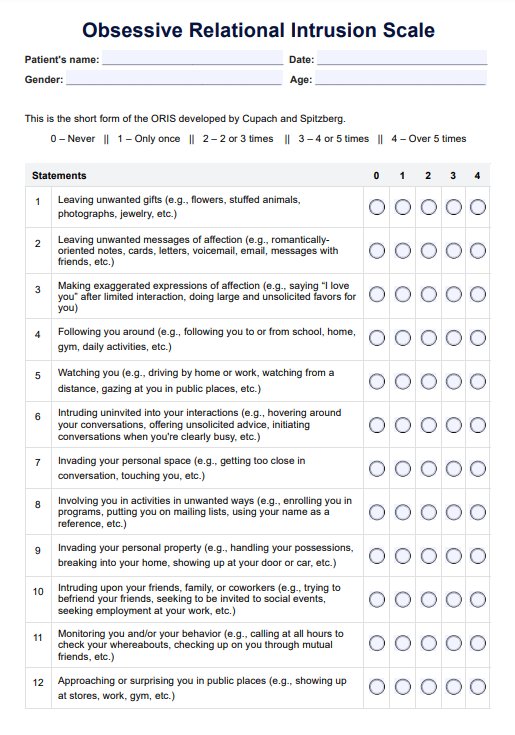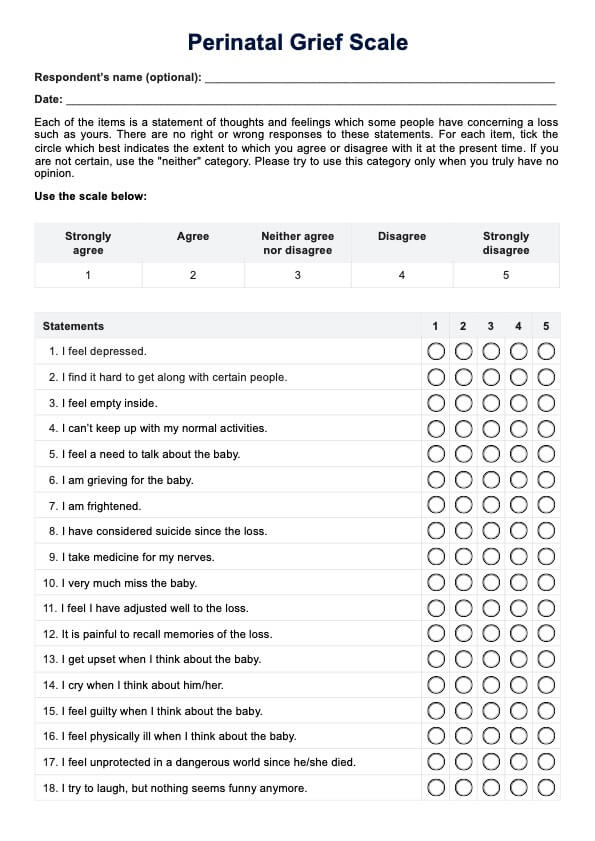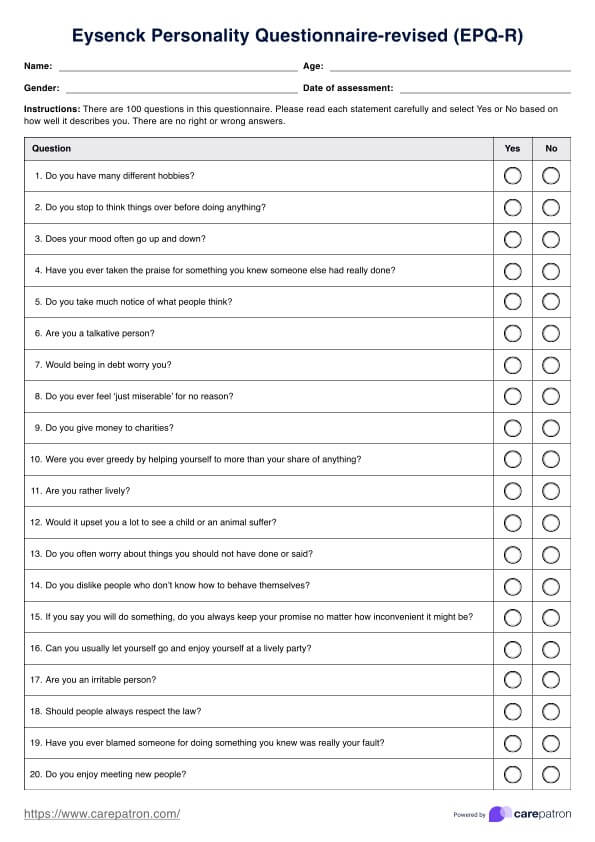Psychiatric Evaluation for Teens
Discover how to conduct effective psychiatric evaluations for teenagers, ensuring comprehensive care and understanding of their mental health needs.


What is a Psychiatric Evaluation for Teenagers?
A psychiatric evaluation for teenagers is a comprehensive assessment conducted by a mental health professional to diagnose and address mental health disorders and issues. This evaluation involves gathering information about the teenager's mental health symptoms, behaviors, and emotional well-being, as well as their underlying medical condition and history, family involvement, and any substance abuse or developmental disorders present.
During the evaluation process, the mental health professional may conduct various assessments and lab tests, including psychological evaluations, blood tests, and radiology studies, to rule out underlying medical conditions and substance use. Family history and involvement are essential factors in understanding the teenager's condition.
The evaluation aims to determine the presence of any psychiatric symptoms or conditions, such as anxiety, depression, or bipolar disorder. It involves assessing the teenager's daily life, relationships, behaviors, and how these physical and psychiatric symptoms affect their daily functioning.
The evaluation helps establish short-term and long-term treatment goals and options by identifying the teenager's symptoms, needs, and concerns. It provides reassurance to both the teenager and their parents or caregivers, as untreated mental health issues can have significant impacts on well-being and development.
Family involvement is crucial in the evaluation process, as it helps the mental health professional understand the dynamics within the family and how they may contribute to the teenager or child's symptoms themselves.
Psychiatric Evaluation for Teens Template
Psychiatric Evaluation for Teens Example
When is a psychiatric evaluation required?
Recognizing signs that indicate a teenager may need a psychiatric evaluation is crucial for early intervention and support. Here are some common indicators:
Behavioral changes
Teenagers experiencing sudden shifts in behavior, social withdrawal, difficulties managing stress, or abrupt changes in school performance may be exhibiting signs of underlying mental health issues.
- Changes in behavior: Abrupt or significant changes in behavior, such as increased irritability, aggression, withdrawal, or mood swings, may signal underlying mental health issues.
- Social withdrawal: Withdrawal from friends, social activities, or previously enjoyed hobbies can be a sign of depression, anxiety, or other mental health concerns.
- Difficulty coping with stress: Teenagers who have difficulty coping with stressors, such as school pressure, family conflicts, or peer relationships, may benefit from a psychiatric evaluation to address underlying issues.
- Sudden changes in performance or behavior at school: Deterioration in academic performance, frequent absences, or disciplinary issues at school may suggest the presence of mental health issues that require evaluation.
Emotional and mood symptoms
Persistent feelings of sadness or hopelessness, difficulty concentrating, self-harm tendencies, or extreme fluctuations in energy levels could indicate the presence of mood disorders or other emotional challenges.
- Persistent sadness or hopelessness: Teenagers experiencing persistent sadness, hopelessness, or feelings of worthlessness that interfere with daily functioning may require evaluation for depression or other mood disorders.
- Difficulty concentrating: Persistent difficulty concentrating, staying focused, or experiencing a decline in academic performance may indicate attention-deficit/hyperactivity disorder (ADHD) or other cognitive issues.
- Self-harm or suicidal thoughts: Any indication of self-harm behaviors, suicidal ideation, or expressions of hopelessness and despair should be taken seriously and prompt immediate psychiatric evaluation.
- Extreme changes in energy levels: Extreme fluctuations in energy levels, such as periods of high energy followed by lethargy or fatigue, may be indicative of mood disorders like bipolar disorder.
Physical symptoms
Physical manifestations, such as changes in eating or sleeping patterns, along with unexplained physical complaints of other illnesses, may indicate underlying psychological distress requiring attention.
- Changes in eating or sleeping patterns: Significant changes in eating or sleeping habits, such as drastic weight loss or gain, insomnia, or oversleeping, could be signs of an underlying mental health disorder.
- Unexplained physical symptoms: Chronic physical complaints such as headaches, stomachaches, or fatigue without a clear medical cause may manifest underlying psychological distress.
Substance use
Experimental or excessive drug and alcohol use can indicate a mental health disorder. The individual may be trying to self-medicate for untreated symptoms. This means they need to be evaluated and supported.
Family history
If someone in your family has struggled with mental illness or psychiatric disorders, it's possible that a teenager in your family could face similar issues. It's essential to keep an eye out for signs of mental health problems and consider seeking a psychiatric evaluation if necessary.
What should a teenager expect during a psychiatric evaluation?
During a psychiatric evaluation, a teenager can expect a thorough and compassionate assessment conducted by a mental health professional. Here's what they may encounter in mental health evaluation:
- Medical history: The evaluator will gather information about the teenager's medical history, including past or current physical health issues, medications, and treatments.
- Psychological assessment: The teenager may undergo various psychological assessments to evaluate their cognitive functioning, emotional state, and specific symptoms.
- Family history: The evaluator may inquire about the teenager's family history of mental illness or substance abuse, as this can provide valuable insight into potential genetic predispositions or environmental factors.
- Behavioral observation: The evaluator will observe the teenager's behavior and interaction during the evaluation to assess their demeanor, communication style, and any observable symptoms.
- Diagnostic evaluation: Based on the information gathered, the evaluator will make a diagnostic assessment to determine if the teenager meets the criteria for any mental health disorders.
- Treatment recommendations: Following the evaluation, the mental health professional will discuss their findings with the teenager and their family, if appropriate, and provide treatment recommendations, which may include therapy, medication, or other interventions.
Note: You can also use the Mental Health Evaluation template to conduct thorough assessments of your clients' psychological well-being. This template provides a structured approach to evaluating mental health symptoms and needs, supporting more accurate diagnosis and treatment planning.
Questions asked during a Psychiatric Evaluation for Teenagers
During a psychiatric evaluation for teenagers, mental health professionals ask questions to gain insight into the teenager's emotional well-being, behavior, and potential mental health concerns. These questions typically cover several vital areas:
Presenting concerns and symptoms
- What brings you in today?
- Can you describe the symptoms or issues you're experiencing?
Medical and psychiatric history
- Do you have any past or current medical conditions?
- Have you received any previous mental health treatment or therapy?
Family and social history
- Do any family members have a history of mental health issues?
- How is your relationship with your family members?
- How are your relationships with friends?
- Do you feel supported by your peers?
Emotional well-being and mood
- How do you typically feel on a day-to-day basis?
- Have you noticed any changes in your mood recently?
Behavioral patterns and substance use
- Have you experienced any significant changes in your behavior?
- Do you engage in any risky behaviors?
- Have you ever used drugs or alcohol?
- If yes, how often and in what quantity?
Thoughts and feelings, sleep, appetite, stressors, coping mechanisms, interests and hobbies
- Do you ever feel hopeless or like life isn't worth living?
- Do you have any thoughts of hurting yourself or others?
- How is your sleep? Do you have trouble falling asleep or staying asleep?
- Have you noticed any changes in your appetite?
- What do you do to cope with stress?
- Have you noticed any changes in your interests or hobbies?
Next steps
After identifying common mental health conditions present during a psychiatric evaluation for teenagers, the following steps typically involve:
- Treatment planning: A comprehensive treatment plan is developed based on diagnosing and assessing the teenager's needs. This plan may include therapy, medication, lifestyle changes, and other interventions tailored to address the specific mental health condition and symptoms.
- Referral to specialists: Depending on the complexity of the diagnosis and treatment needs, the teenager may be referred to specialized mental health professionals, such as psychiatrists, psychologists, or counselors, with expertise in managing the identified condition.
- Monitoring and follow-up: Regular monitoring of the teenager's progress is essential to assess the effectiveness of treatment and make any necessary adjustments. Follow-up appointments with the mental health provider and other healthcare professionals are scheduled as needed.
- Education and support: Providing education and support to the teenager and their family about the mental health condition, coping strategies, and resources available can empower them to manage symptoms and navigate challenges effectively.
- Advocacy and community resources: Advocating for the teenager's needs and connecting them with community resources, such as support groups, educational programs, or vocational services, can enhance their overall recovery and quality of life.
Commonly asked questions
During a psychiatric evaluation, a mental health professional assesses a person's mental health status by gathering information about their symptoms, medical history, family background, and current functioning. This may involve a structured interview, psychological assessments, and behavior observation.
Questions in a psychiatric evaluation cover a range of topics, including current symptoms, medical history, family dynamics, social relationships, substance use, stressors, coping mechanisms, and thoughts or feelings of self-harm or suicide.
A psychiatric assessment for children under 18 involves evaluating their emotional, behavioral, and developmental functioning to diagnose and address mental health issues. It may include interviews with the child and their caregivers, behavior observation, and developmental milestones assessment.


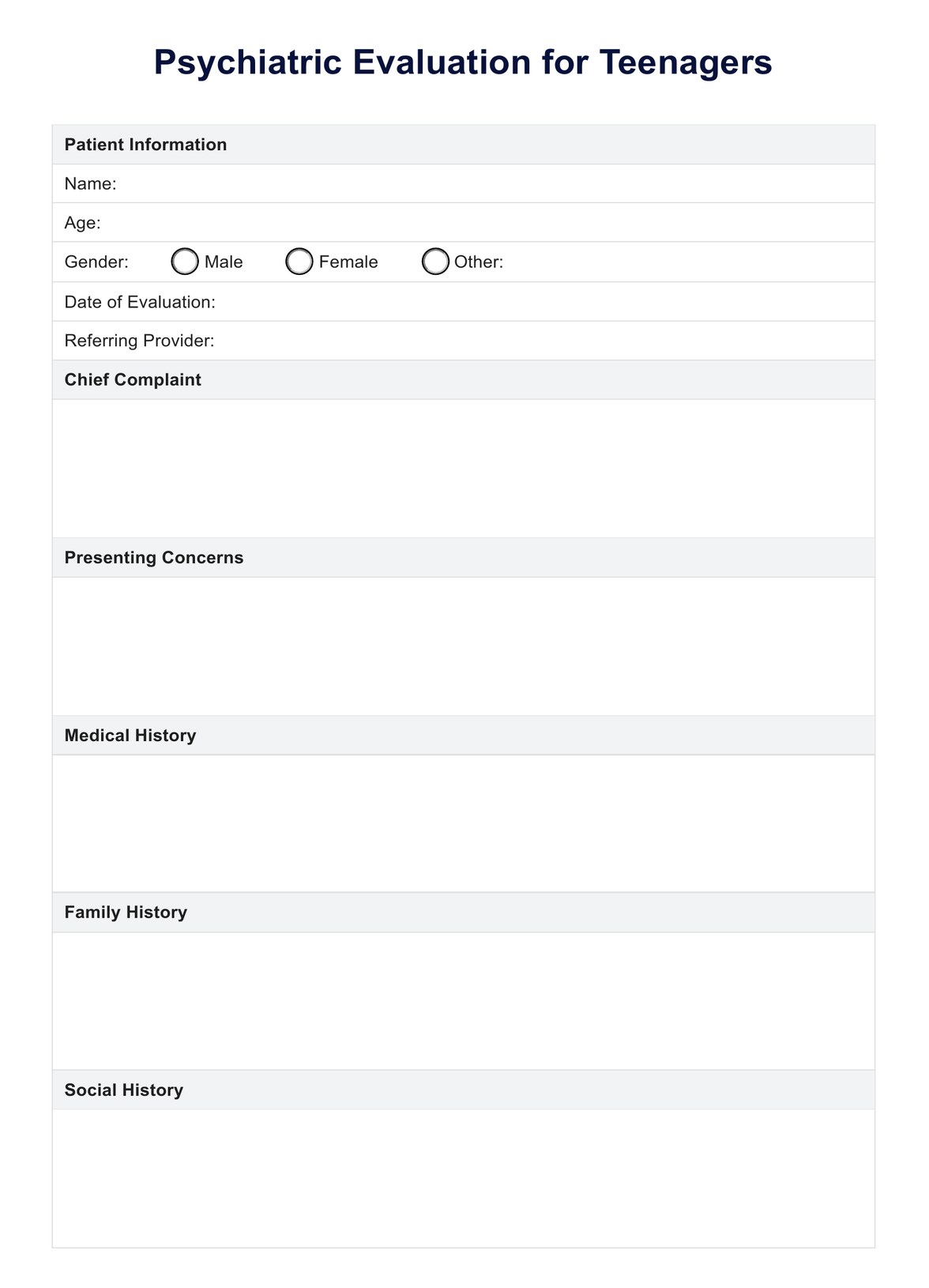
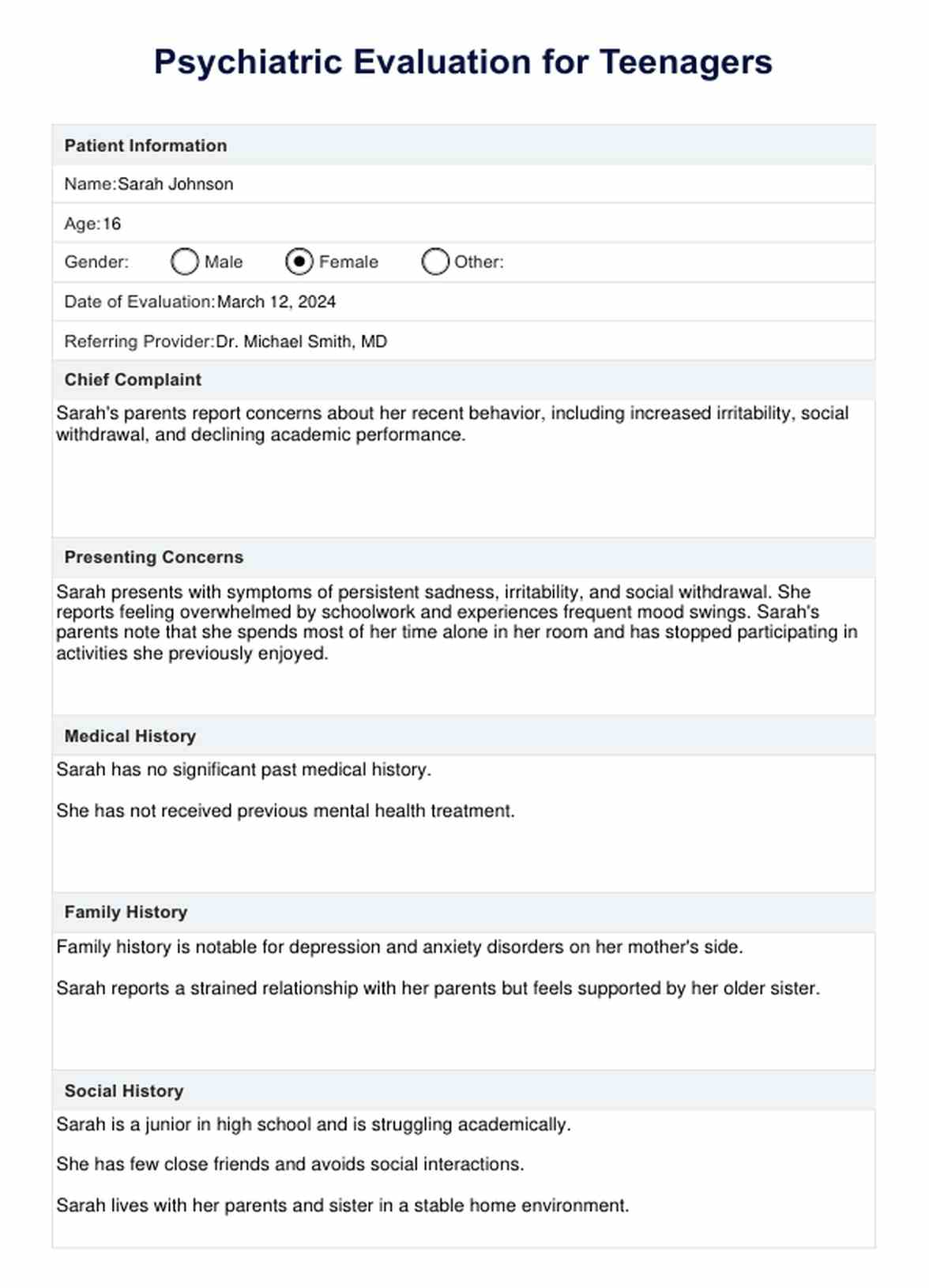

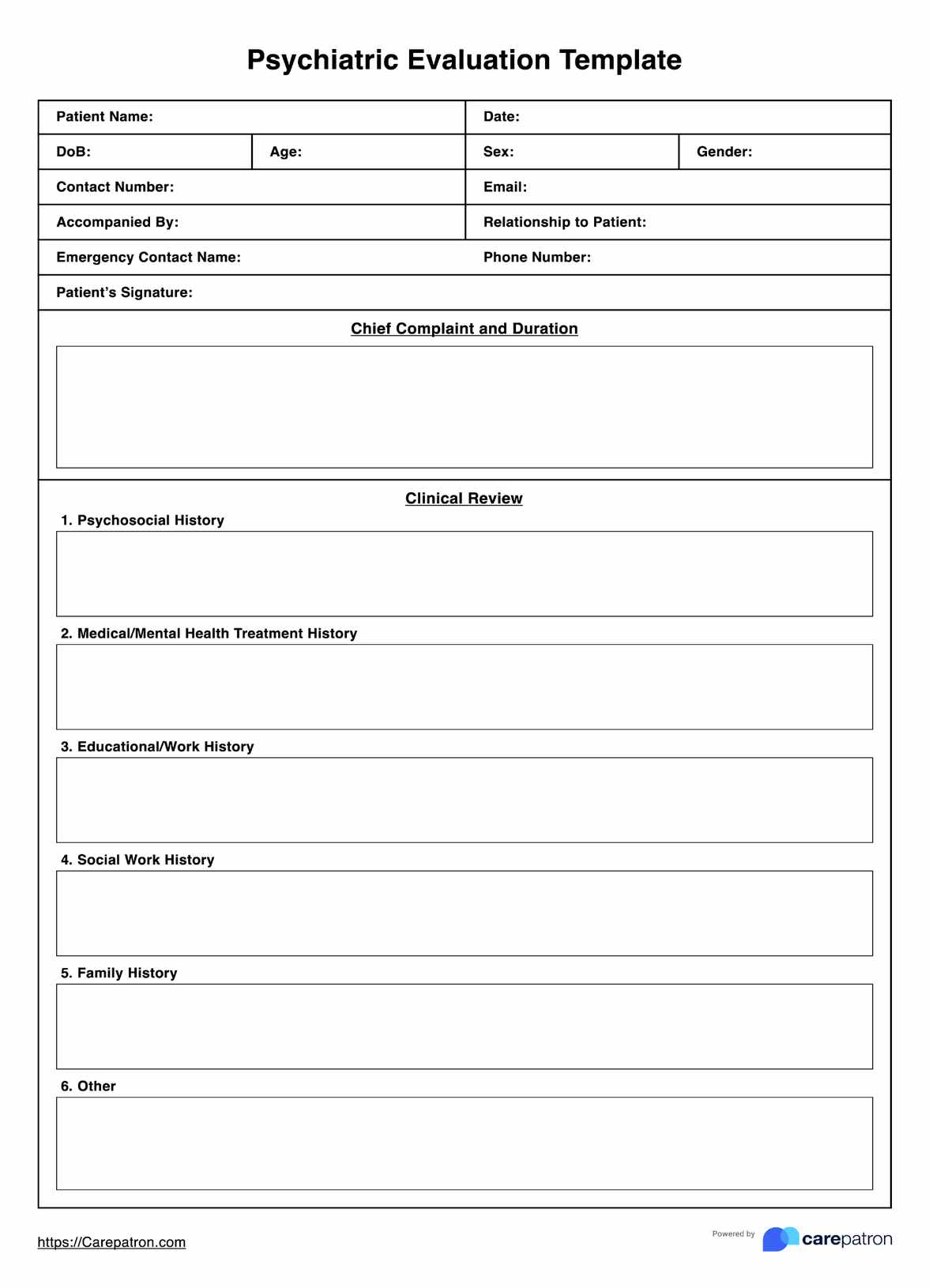
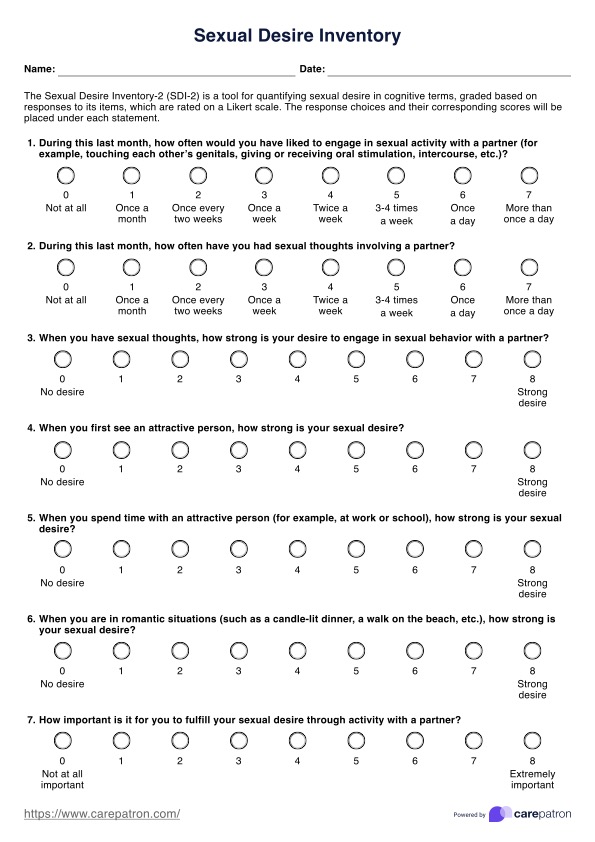
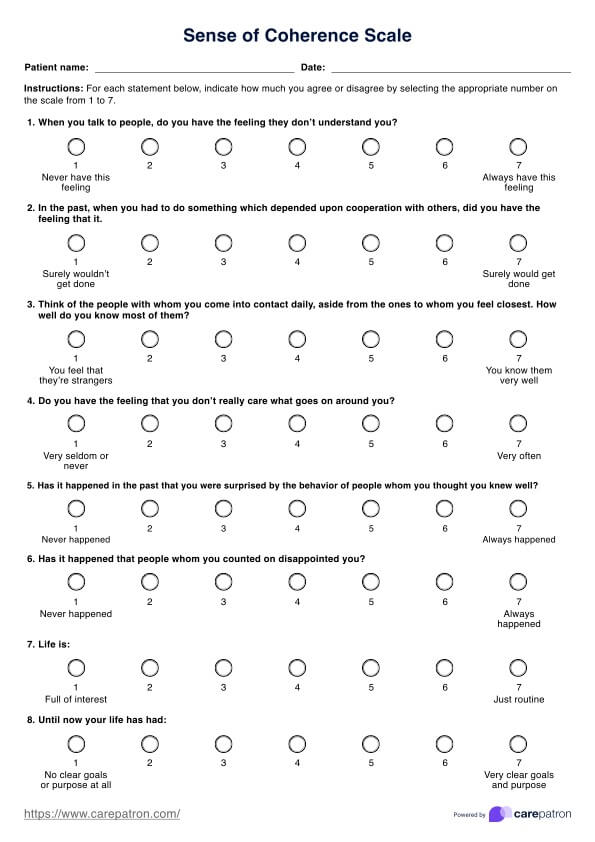












-template.jpg)
















































































